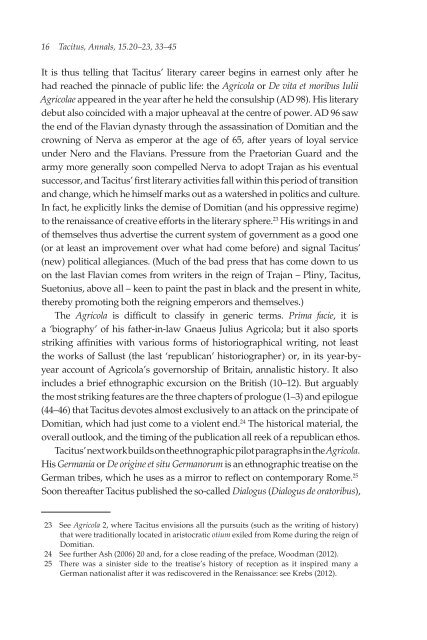Tacitus, Annals, 15.20-23, 33-45. Latin Text, Study Aids with Vocabulary, and Commentary, 2013a
Tacitus, Annals, 15.20-23, 33-45. Latin Text, Study Aids with Vocabulary, and Commentary, 2013a
Tacitus, Annals, 15.20-23, 33-45. Latin Text, Study Aids with Vocabulary, and Commentary, 2013a
You also want an ePaper? Increase the reach of your titles
YUMPU automatically turns print PDFs into web optimized ePapers that Google loves.
It is thus telling that <strong>Tacitus</strong>’ literary career begins in earnest only after he<br />
had reached the pinnacle of public life: the Agricola or De vita et moribus Iulii<br />
Agricolae appeared in the year after he held the consulship (AD 98). His literary<br />
debut also coincided <strong>with</strong> a major upheaval at the centre of power. AD 96 saw<br />
the end of the Flavian dynasty through the assassination of Domitian <strong>and</strong> the<br />
crowning of Nerva as emperor at the age of 65, after years of loyal service<br />
under Nero <strong>and</strong> the Flavians. Pressure from the Praetorian Guard <strong>and</strong> the<br />
army more generally soon compelled Nerva to adopt Trajan as his eventual<br />
successor, <strong>and</strong> <strong>Tacitus</strong>’ first literary activities fall <strong>with</strong>in this period of transition<br />
<strong>and</strong> change, which he himself marks out as a watershed in politics <strong>and</strong> culture.<br />
In fact, he explicitly links the demise of Domitian (<strong>and</strong> his oppressive regime)<br />
to the renaissance of creative efforts in the literary sphere. <strong>23</strong> His writings in <strong>and</strong><br />
of themselves thus advertise the current system of government as a good one<br />
(or at least an improvement over what had come before) <strong>and</strong> signal <strong>Tacitus</strong>’<br />
(new) political allegiances. (Much of the bad press that has come down to us<br />
on the last Flavian comes from writers in the reign of Trajan – Pliny, <strong>Tacitus</strong>,<br />
Suetonius, above all – keen to paint the past in black <strong>and</strong> the present in white,<br />
thereby promoting both the reigning emperors <strong>and</strong> themselves.)<br />
The Agricola is difficult to classify in generic terms. Prima facie, it is<br />
a ‘biography’ of his father-in-law Gnaeus Julius Agricola; but it also sports<br />
striking affinities <strong>with</strong> various forms of historiographical writing, not least<br />
the works of Sallust (the last ‘republican’ historiographer) or, in its year-byyear<br />
account of Agricola’s governorship of Britain, annalistic history. It also<br />
includes a brief ethnographic excursion on the British (10–12). But arguably<br />
the most striking features are the three chapters of prologue (1–3) <strong>and</strong> epilogue<br />
(44–46) that <strong>Tacitus</strong> devotes almost exclusively to an attack on the principate of<br />
Domitian, which had just come to a violent end. 24 The historical material, the<br />
overall outlook, <strong>and</strong> the timing of the publication all reek of a republican ethos.<br />
<strong>Tacitus</strong>’ next work builds on the ethnographic pilot paragraphs in the Agricola.<br />
His Germania or De origine et situ Germanorum is an ethnographic treatise on the<br />
German tribes, which he uses as a mirror to reflect on contemporary Rome. 25<br />
Soon thereafter <strong>Tacitus</strong> published the so-called Dialogus (Dialogus de oratoribus),<br />
<strong>23</strong> See Agricola 2, where <strong>Tacitus</strong> envisions all the pursuits (such as the writing of history)<br />
that were traditionally located in aristocratic otium exiled from Rome during the reign of<br />
Domitian.<br />
24 See further Ash (2006) 20 <strong>and</strong>, for a close reading of the preface, Woodman (2012).<br />
25 There was a sinister side to the treatise’s history of reception as it inspired many a<br />
German nationalist after it was rediscovered in the Renaissance: see Krebs (2012).


















